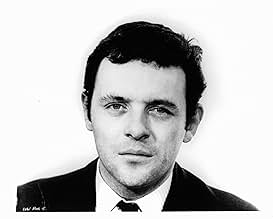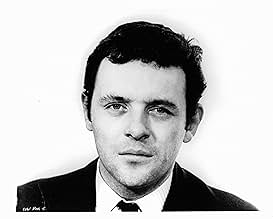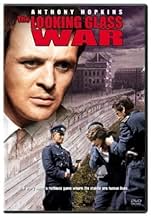CALIFICACIÓN DE IMDb
5.8/10
1.6 k
TU CALIFICACIÓN
Agrega una trama en tu idiomaFrom the John le Carré novel about a British spy who sends a Polish defector to East Germany to verify missile sites.From the John le Carré novel about a British spy who sends a Polish defector to East Germany to verify missile sites.From the John le Carré novel about a British spy who sends a Polish defector to East Germany to verify missile sites.
- Dirección
- Guionistas
- Elenco
Opiniones destacadas
A disappointing adaptation of a good book, with a key aspect of the latter (inter-departmental rivalry) being omitted. I located an on-line copy after the usual frustrations of working through links to Youtube that led to short clips, paid subscription copies and so on.
With several jumps in the plot, I did wonder if the version I saw had been hacked around, but it was the 108 minutes stated here on IMDb. Christopher Jones was unconvincing and uninspiring as Leiser, his fight with Avery a prolonged interpolation and his scrabbling around to get under the wire in the dark protracted. And how lucky he was to come across an attractive girl and child (what happened to him?) in the middle of nowhere - and to bump into her again in a cafe.
The best things were the wide, open European spaces and Anthony Hopkins' acting
With several jumps in the plot, I did wonder if the version I saw had been hacked around, but it was the 108 minutes stated here on IMDb. Christopher Jones was unconvincing and uninspiring as Leiser, his fight with Avery a prolonged interpolation and his scrabbling around to get under the wire in the dark protracted. And how lucky he was to come across an attractive girl and child (what happened to him?) in the middle of nowhere - and to bump into her again in a cafe.
The best things were the wide, open European spaces and Anthony Hopkins' acting
Made in 1969 this adaptation of a Le Carré novel isn't faithful to every element of the original book, and is heavily influenced by other contemporary films.
This means it isn't quite as uniformly bleak as many other Le Carré adaptations but depending on how you take it, it is perhaps hard to really believe in or sympathise with any of the characters. This is despite some pretty good performances by some of the lead actors.
What is perhaps missing is the clever editing, taut direction and sheer screen presence that (say) Michael Caine brings to the Harry Palmer movies (even though the plots of those are not exactly uniformly brilliant) or Richard Burton brings to "the spy who came in from the cold". Those movies stand head and shoulders above this.
Technically this film is well-photographed and the dubbing is well done too; however it is perhaps understandable if the pace of the film wanders, given that it looks a lot like they decided to shoehorn various sequences into the plot purely for stylistic reasons.
Some of the criticisms in the other reviews here are spot on and others are (IMHO) thoroughly misplaced; no spoilers here so you will have to work out which for yourself. I guess it is a bit of a curate's egg, this; "good in parts". Therefore if you approach it with suitable expectations you will probably find enough things about this movie to like to make it worth watching.
Overall this film probably isn't as bad as the knockers would lead you to suppose and nor is it as good as the 'ten' folk make out either. It is certainly an interesting period piece but it is also a little more than that too, so it gets 6/10 from me.
This means it isn't quite as uniformly bleak as many other Le Carré adaptations but depending on how you take it, it is perhaps hard to really believe in or sympathise with any of the characters. This is despite some pretty good performances by some of the lead actors.
What is perhaps missing is the clever editing, taut direction and sheer screen presence that (say) Michael Caine brings to the Harry Palmer movies (even though the plots of those are not exactly uniformly brilliant) or Richard Burton brings to "the spy who came in from the cold". Those movies stand head and shoulders above this.
Technically this film is well-photographed and the dubbing is well done too; however it is perhaps understandable if the pace of the film wanders, given that it looks a lot like they decided to shoehorn various sequences into the plot purely for stylistic reasons.
Some of the criticisms in the other reviews here are spot on and others are (IMHO) thoroughly misplaced; no spoilers here so you will have to work out which for yourself. I guess it is a bit of a curate's egg, this; "good in parts". Therefore if you approach it with suitable expectations you will probably find enough things about this movie to like to make it worth watching.
Overall this film probably isn't as bad as the knockers would lead you to suppose and nor is it as good as the 'ten' folk make out either. It is certainly an interesting period piece but it is also a little more than that too, so it gets 6/10 from me.
Most of the reviews I have given are of films that I saw at the cinema upon its release and have then recently watched again. However, THE LOOKING GLASS WAR is a movie that I never got around to watching at the pictures, therefore, I decided to shell out 3 pounds and buy the DVD. I must say that I am glad I did as I quite enjoyed it. A young Christopher Jones plays a Polish seaman who is recruited by British Intelligence to go into East Germany to check out some missiles in return for being given leave to stay in the UK. The acting was better than I thought it would be and the storyline was OK. I liked the jazzy soundtrack as well. Not a bad film at all and worth the 3 quid I paid.
A uniformed boarder guard actually says "Your papers please!" in this drab adaptation of John Le Carre's novel (with Bergmanesque visuals from cameraman Austin Dempster).
First-time director Frank R. Pierson had recently received two Oscar nominations as a scriptwriter when Columbia gambled upon his ability to direct a feature film. Columbia lost, it went out on the graveyard shift in February and Pierson went back to TV for several more years.
Both leads were blessed with sullen good looks but not the ability to speak English and soon disappeared. Fortunately they're backed by a fine line-up of British acting talent who are the ones who make the film worth watching. (As in the earlier Le Carre adaptation 'The Deadly Affair' time is devoted to the unhappy home lives of the minders; and again it's not a pretty sight.)
First-time director Frank R. Pierson had recently received two Oscar nominations as a scriptwriter when Columbia gambled upon his ability to direct a feature film. Columbia lost, it went out on the graveyard shift in February and Pierson went back to TV for several more years.
Both leads were blessed with sullen good looks but not the ability to speak English and soon disappeared. Fortunately they're backed by a fine line-up of British acting talent who are the ones who make the film worth watching. (As in the earlier Le Carre adaptation 'The Deadly Affair' time is devoted to the unhappy home lives of the minders; and again it's not a pretty sight.)
Frank Pierson made a very ambitious bet when he wrote the screenplay and directed the film version of John Le Carré's The Looking Glass War. I admire that ambition, but he only partially succeeded. The novel is a bitter, dark and gritty tale, with lots of satire, of old spymasters reliving their past glories. For that reason they are not up to the job of managing a modern and "Cold" War. Instead of "simply" telling that great and worthy story, Pierson seems to have been inspired by the Swinging 60's, with counterculture movements and young people everywhere pushing back against previous generations, to make an even bigger and more flamboyant statement of generational angst than Le Carré intended. This might have worked if executed well, but a few mistakes undercut him. He chose two beautiful, quirky, fast-rising stars, Christopher Jones and Pia Degermark as the leads. Jones' recruitment scenes were not believable, and neither was Degermark's two deus ex machina moments of entering the spy's life. But they were very nice to watch, and the very good cinematography helped, too. A few other turn-offs, for me were several tedious segments when I thought Pierson was channelling Michelangelo Antonioni, location shots that do not look like anyplace I've ever seen in Germany, as well an overly abrupt ending. In the end Pierson seems to have abandoned Le Carré's biting satire, and he jumbled the shift to generational angst.
¿Sabías que…?
- TriviaA radio play of John le Carré's novel "The Looking Glass War" was produced and broadcast by Radio 4 in 2009, with Simon Russell Beale as George Smiley, Piotr Baumann as Leiser, Patrick Kennedy as Avery, and Ian McDiarmid as LeClerc. This radio play featured the George Smiley character, who had been dropped for this movie.
- ErroresThe photograph of a railway yard that was the pretext for the mission was supposedly taken in East Germany but the locomotive in the picture is immediately recognizable to any ex-trainspotter as a British Rail type manufactured by English Electric.
- Citas
Leiser: What's your name?
John Avery: You can't have my name, it's a breach of security.
Leiser: You know, I'm risking my life for you so I want a name, give me a name, I don't care. Any name!
John Avery: John.
Leiser: John. John.
- ConexionesFeatured in Al Murray's Great British Spy Movies (2014)
Selecciones populares
Inicia sesión para calificar y agrega a la lista de videos para obtener recomendaciones personalizadas
- How long is The Looking Glass War?Con tecnología de Alexa
Detalles
- Fecha de lanzamiento
- País de origen
- Sitio oficial
- Idiomas
- También se conoce como
- John le Carré's The Looking Glass War
- Locaciones de filmación
- España(made on location in Europe, kinema weekly 19/10 68)
- Productoras
- Ver más créditos de la compañía en IMDbPro
Taquilla
- Total en EE. UU. y Canadá
- USD 168,000
- Tiempo de ejecución1 hora 48 minutos
- Color
- Relación de aspecto
- 2.35 : 1
Contribuir a esta página
Sugiere una edición o agrega el contenido que falta

Principales brechas de datos
By what name was The Looking Glass War (1970) officially released in India in English?
Responda






































